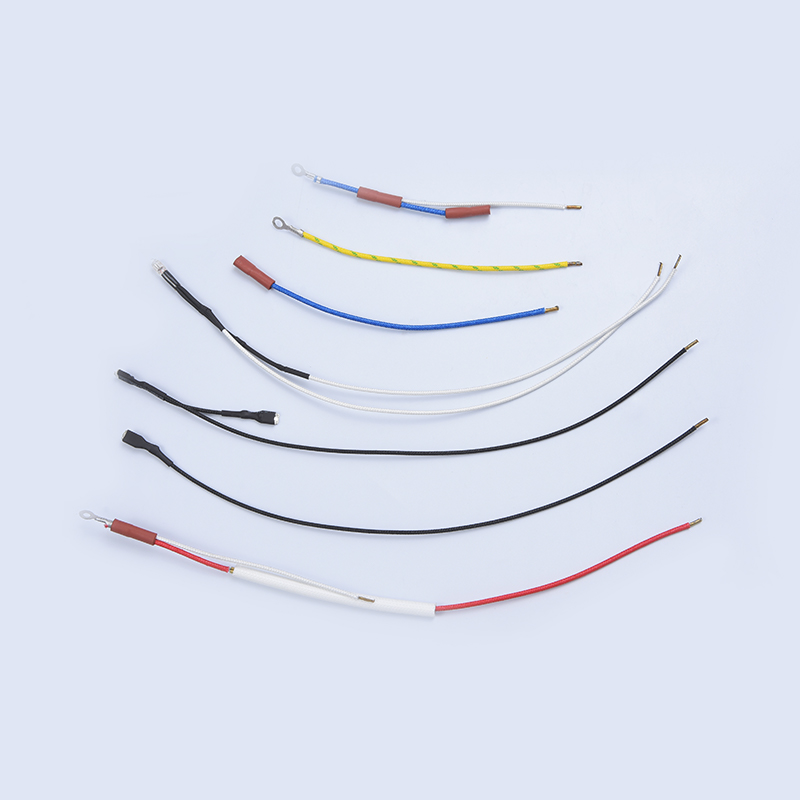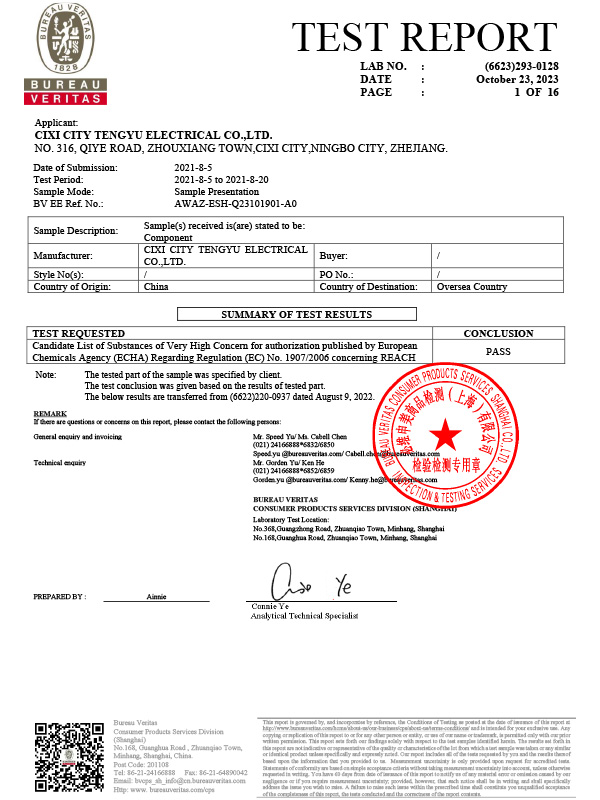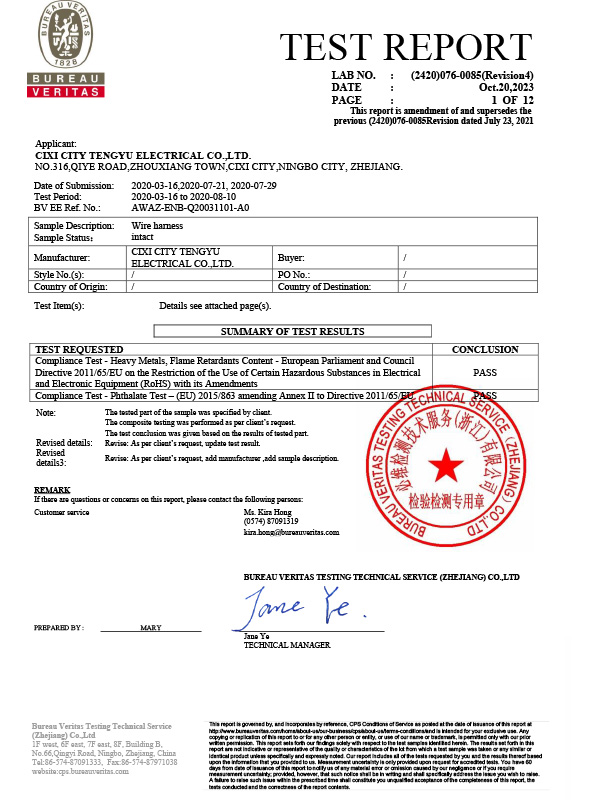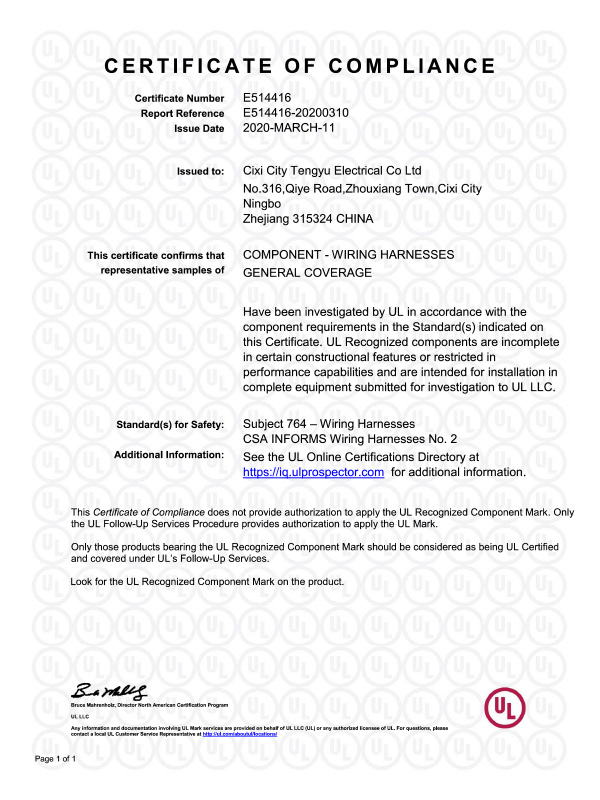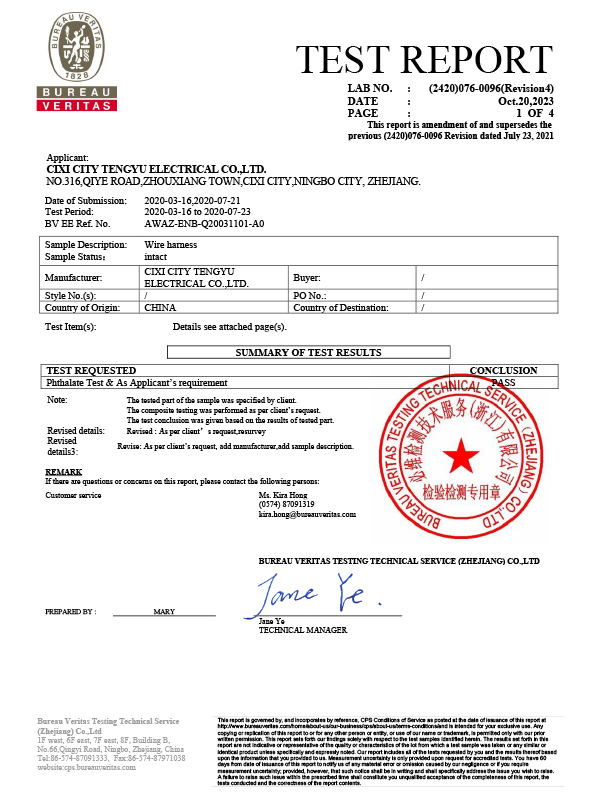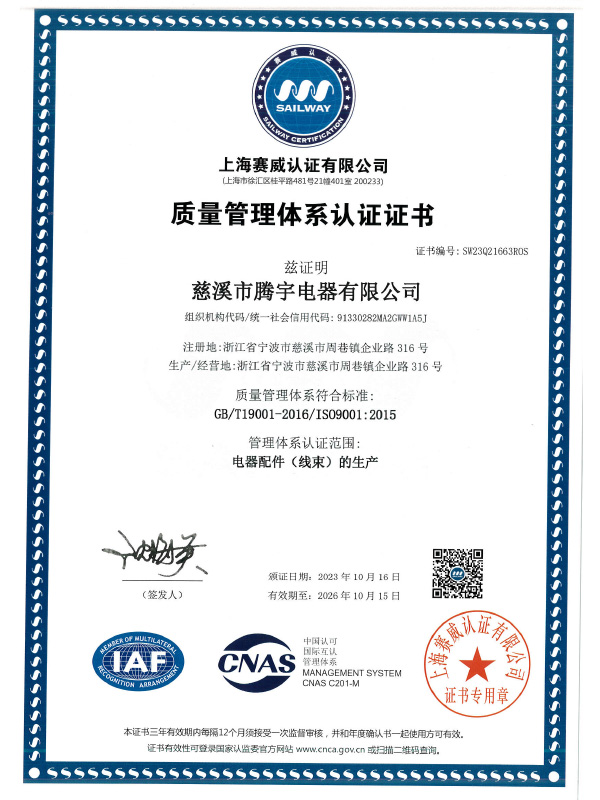What role does the wiring harness of an oil heater play in its heating efficiency?
The wiring harness plays a crucial role in the heating efficiency of an oil heater, directly impacting stable current transmission, heating speed, uniformity, and energy efficiency. A high-quality oil heater wiring harness not only ensures efficient current flow and reduces energy loss, but also enhances heating efficiency and equipment safety by selecting appropriate conductor and insulation materials. Proper design and material selection ensure that the oil heater reaches the set temperature quickly and evenly during heating, minimizing energy waste and thus improving overall performance and service life.
Current Transmission Stability: The primary function of the wiring harness of an oil heater is to ensure stable current transmission to the heating element. High-quality oil heater wiring harness design and materials can reduce electrical resistance during current transmission, ensuring smooth and unimpeded current flow. The oil heater wiring harness's connection points, the conductor material (typically copper), and the strength of the connectors all play a crucial role in current stability. Stable current transmission ensures that the heating element operates efficiently at the desired power, quickly heating the oil and ensuring the oil heater reaches the set temperature.
Reducing Current Loss: During operation, if current flows through a oil heater wiring harness with high resistance, it can result in energy loss and reduce the heating efficiency of the oil heater. For example, a low-quality oil heater wiring harness may increase resistance, wasting some energy. High-quality wiring harnesses, on the other hand, ensure efficient current transmission and avoid energy waste. Using high-quality oil heater wiring harnesses reduces current loss, ensuring that more electrical energy is effectively converted into heat for heating the oil, thereby improving overall heating efficiency.
The Importance of Wire Material: Copper is typically used in oil heater wiring harnesses due to its excellent conductivity and high-temperature resistance. Copper wire reduces resistance during current flow and improves energy transmission efficiency. Furthermore, copper wire is highly resistant to corrosion over long-term use, preventing degradation of conductivity due to oxidation or corrosion. Lower resistance means lower energy loss, which contributes to efficient operation of the oil heater.
Wiring Harness Insulation: The insulation material of the wiring harness has a direct impact on heating efficiency and safety. High-quality insulation effectively prevents current leakage, ensuring the integrity and stability of the current flow, and avoiding energy waste due to electrical faults or leakage. High-quality insulating materials (such as silicone, PVC, and polyvinyl chloride) are heat-resistant, age-resistant, and corrosion-resistant, ensuring that the wiring harness will not damage or deteriorate in high-temperature environments, thereby maintaining long-term, stable current transmission performance.
Improving Heating Speed and Uniformity: When an oil heater heats a liquid, the stability of the current directly impacts the heating speed and uniformity. A well-designed wiring harness ensures that current is evenly distributed across the heating elements, preventing uneven heating. For example, an improperly designed wiring harness can cause some heating elements to malfunction, affecting the uniformity of the oil heating. Using a high-quality wiring harness ensures uniform heating during the heating process, avoiding hot or cold spots, and improving overall heating quality and comfort.
Reducing Energy Waste: The material and design of the wiring harness significantly impact energy efficiency during heating. A high-quality wiring harness ensures efficient current transmission, reducing energy waste, enabling the heater to reach the desired temperature faster and maintain stable temperature control for longer periods of time. Choosing wiring harnesses that are heat-resistant, age-resistant, and highly conductive can significantly reduce energy waste caused by material issues and improve the overall efficiency of oil heaters.
How to ensure the safety of oil heater wiring harnesses?
The safety of oil heater wiring harnesses is a key factor in ensuring stable equipment operation and user safety. The wiring harness's high-temperature resistance, corrosion resistance, insulation performance, terminal stability, and current carrying capacity all directly impact the safety of oil heaters. In high-temperature environments, a high-quality wiring harness can withstand the heat of prolonged heating, preventing insulation breakdown or electrical failure. Furthermore, corrosion-resistant wires and robust terminals ensure stable operation in harsh environments, avoiding safety hazards. A well-designed current carrying capacity ensures the stability and reliability of oil heaters during high-power operation. Comprehensively ensuring wiring harness safety can extend the lifespan of oil heaters and minimize the risk of failure.
High-temperature resistance: As high-power heating devices, oil heaters generate high temperatures during prolonged operation, making wiring harnesses essential for high-temperature resistance. The wiring harness's conductors and insulation materials must be able to withstand the high temperatures generated during operation to prevent melting or damage to the insulation. High-quality wiring harnesses typically use high-temperature-resistant materials such as silicone and PVC to ensure stable operation in high-temperature environments, preventing electrical failures or fire risks caused by overheating. High-temperature-resistant wiring harnesses help extend the life of oil heaters and ensure safe operation.
Corrosion resistance: Oil heater wiring harnesses are often used in humid or high-temperature environments, making corrosion resistance crucial. The wires in wiring harnesses are typically made of copper or tinned copper, which effectively resist corrosion in humid environments and ensure stable current transmission. Corrosion increases wire resistance, affecting current transmission efficiency and even causing electrical safety issues such as short circuits and leakage. Selecting corrosion-resistant materials and implementing corrosion-resistant designs ensures long-term stable operation of wiring harnesses and effectively prevents corrosion damage to electrical systems even in harsh environments.
Insulation performance: The insulation performance of wiring harnesses is directly related to electrical safety. High-quality wiring harnesses require corrosion-resistant and age-resistant insulation materials, such as polyvinyl chloride (PVC) and silicone. These materials maintain stable insulation properties under high temperatures and prolonged use, preventing current leakage and short circuits. The insulation layer of the wiring harness must be sufficiently thick to withstand wear, compression, and friction during long-term use, ensuring that electrical failures caused by insulation breakdown during use are avoided.
Connector Terminal Stability: The wiring harness's connector terminals must be carefully designed to ensure stability and durability. Loose terminals can lead to unstable current flow and increase contact resistance, potentially posing safety hazards such as overheating and electrical fires. Therefore, the design of the connector terminals must not only ensure a secure connection but also provide strong vibration and oxidation resistance to withstand the vibration and high temperatures experienced by the oil heater during operation. High-quality wiring harnesses will be made of corrosion-resistant and oxidation-resistant materials to ensure long-term terminal stability and avoid electrical failures caused by looseness or corrosion.
Current Carrying Capacity: The oil heater wiring harness must be able to carry a certain current load to prevent overheating or damage during prolonged high-power heating. The wiring harness design should select appropriate wire specifications based on the oil heater's power requirements. The wire cross-section should be sufficiently large to reduce resistance during current transmission, minimizing the risk of overheating the heating element or melting the wiring harness due to overload. Designing an appropriate current load capacity can ensure the electrical safety of the oil heater during long-term use and avoid safety hazards such as fire caused by overload.




 中文简体
中文简体